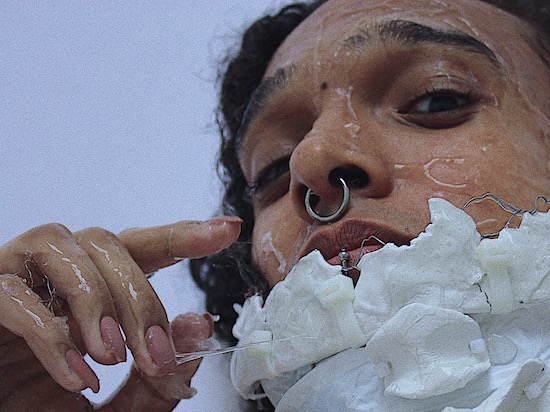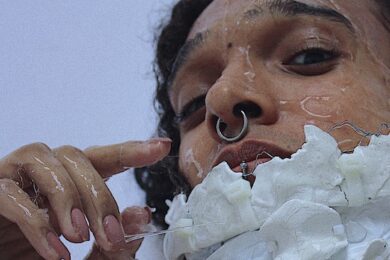Iceboy Violet 1 (credit Ana Radtsenko)
The White Hotel in Salford, Greater Manchester, is at the centre of one of the most exciting artistic scenes in the UK. There, you’ll find a flourishing group of fearless artists who frequently twist noise, grime, dance, rap and electronica into new and unfamiliar shapes – often with rich and evocative lyricism. One of the most prolific of this collective is emerging artist, Iceboy Violet. They’ve made a name for themselves as the venue’s resident MVP and through support slots with the likes of Loraine James and Moor Mother – amongst many others.
Their debut mixtape, The Vanity Project, is the result of four years of meticulous crafting, honing their sound inside the walls of The White Hotel. “The venue is one of the core things that makes Manchester tick,” they told The Quietus recently. “White Hotel [has] given me opportunities to refine what I do in front of ten people and in front of two hundred people. I’ve played there more than anybody as a live musician.”
On the fringes of the movement at The White Hotel is another – a collective called Mutualism that Iceboy Violet is also a part of. In anthropological speak, the term refers to a kind of symbiotic relationship where all of those involved benefit from their mutual interactions. The Mutualism collective brought Iceboy violet to one such symbiotic relationship: a night at neighbouring Leeds (they’re from Halifax originally) where they saw electronic artist Aya [also known as LOFT] live, playing at Hyde Park Book Club. The experience, they say, was revelatory, leading to a change in their own performance style. It was also where The Vanity Project was born.
They explain: “I was going to see rappers perform and eventually weirder electronic acts, but I felt unengaged. Even when I started performing myself, I was standing behind a desk, turning dials, playing music as if no one was there.” Seeing Aya changed their way of thinking from one of artist-in-isolation to one of being part of a collective artistic community. “That was the first time I’d seen someone take the format of standing behind a desk … and turn it into something completely new,” Violet explains. “[She’d] regularly cut out the music to interact with the crowd … she shakes the audience into realising that a performance involves two. You’re all in there together.”
The idea of all being in it together is at the root of The Vanity Project. On the touching ‘Are U Connected’, which is rich in electronic layering from producer Emily Glass, Violet’s emotive, poetic lyricism urges the listener to “come down, come through” difficult times not in isolation, but with the help of others. It’s a song, in part, about being at your lowest ebb mentally and emotionally and emerging out the other side thanks to connection.
The lack of connection over the last two years has clearly marked the mixtape. The unsettling distortion and death-like tempo on ‘Atone//Blankface’ is drenched in desolation, as is the skittering and minimalistic, Space Afrika-produced ‘Urban Ambiance’. The isolation goes much further back than the pandemic though: the mixtape delves into issues of race – like the loneliness of growing up in a predominantly white area as Violet did as a teenager in Halifax – and art too: when you’re making music the mainstream can’t define or describe yet in a hinterland of rap, electronica, grime and noise, where is your place?
That place is still undefinable and as you’d expect from Violet’s work to date, that’s just how they want it. There is no overriding genre or style on a work that is fiercely experimental. Single songs venture into wildly disparate genres, often simultaneously, from electronica to metal, rap to noise, grime to dance in a flick of a BPM. ‘Urban Ambiance’ is a good example. A deeply introspective song whose lyrics recall Milton and Blake as they speak of heaven and hells, paradise and prisons, grime blends seamlessly with electronica as Violet finds euphoria with others. “We’ll be dancing through the night … dance to it,” they urge, desperate for connection with their audience. As they told us recently, “I just hope we can touch each other in the club again soon.”
The vulnerability of the songs is palpable, like on the desperate ‘Lillieth’. With excellent guest spots from Blackhaine (who they met at The White Hotel) and Daemon & Orlandor, the lines spit and snarl with anger at a desperate situation. It continues too on the ferocious ‘Deathdrive’, a collaboration with Exploited Body that veers into metal as they defiantly shout “I’m still alive … I will survive” on a song that explores coming out the other side of what feels like a dark mental collapse.
Album standout ‘Vanity’ sees Violet unsettled as the focus of attention for a potential hook-up. It’s a breathless exploration of love that descends into a panic-inducing doubt of the self. “I tell people, it’s not a problem for me,” they told us about their desire to write lyrical monologues that don’t hold back on feelings. “There are points where I will, in as vivid details as I can in thirty seconds, explain some of the best and worst things that I’ve been through. That’s a core part of my music: forcing myself to be vulnerable to connect with people. It lets them do the same thing.”
The mixtape does just this – and it’s evident through many of its many collaborations too: all bring their biggest vulnerabilities to the forefront, no doubt following Violet’s lead. There’s local collaborations from The White Hotel in abundance, but ones from further afield as well – like the excellent turns from Florida beatmaker Nick León and Helsinki-based experimentalist Exploited Body. Violet bottles what’s brilliant about the creative space of White Hotel but the work stands alone as a distinct musical offering too: something that the international collaborations here perhaps had a hand in.
The mixtape, at seven songs long and just twenty minutes in length, may be an economical offering, but any longer would perhaps feel too much when dealing with the expansive gut-wrench of emotions Iceboy Violet expresses over this time period. Much is packed into the tape lyrically and sonically, leaving us curious as to just what a full-length project will bring: it’s a tantalising prospect.
“The best compliment I get is when people have both danced and cried during the same set,” Iceboy Violet says of their work. This mixtape has that in abundance. It’s a document of the complex self, a vibrant scene and an evolving sound – and one that ultimately celebrates the power of community and connection in emerging from silence and isolation.



